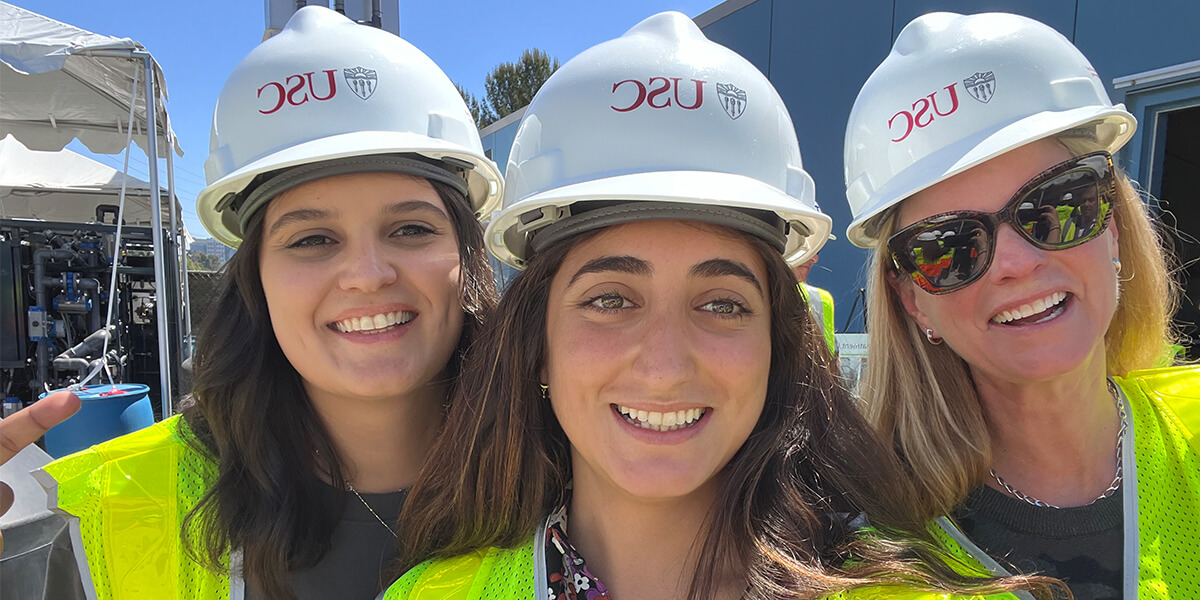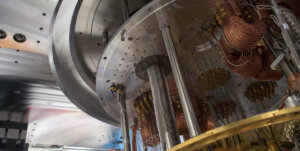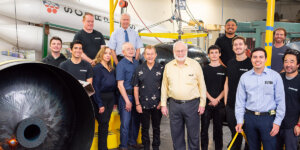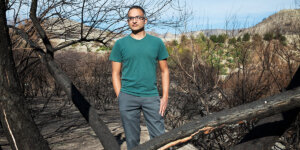
Ana Luiza Behisnelian (center) with colleagues during research fieldwork
Through research projects and guidance from her professors at USC Sonny Astani Department of Civil & Environmental Engineering, master’s student Ana Luiza Behisnelian developed a fascination for water treatment technologies and water usage efficiency. Her primary goal? To work globally to improve water access and quality for underserved communities.
What sparked your interest in environmental engineering, specifically in the domain of water sustainability?
Water is one of the most vital resources on Earth. I want to be involved in treating it, understanding the technologies and studying the behaviors around water use. The work I plan to do is in water resource management, circular economy principles and using our water resources more efficiently. The study of water is so huge and there are so many different areas of focus within a master’s, or even a doctoral program. During my studies at USC, I’ve gained a strong understanding of the various career options in the water sector and the areas that align best with my interests and professional goals.
What led you to pursue a master’s at USC?
My undergraduate degree was in industrial systems engineering in Brazil. I wanted to gain practical experience, so I began professional work during my sophomore year. I initially worked in finance, focusing on lean manufacturing principles and improving operational efficiency for companies. Imagine the extent of the operations management required for a global bank to process all its transactions. There’s a lot of manual work involved! My role was analyzing how to make those operations more concise and efficient as an overall system.
I enjoyed that work for a while, but it wasn’t giving me a sense of greater purpose. I wanted a career with a more tangible positive impact. During my undergraduate years, I pursued a minor in energy and sustainability which connected me with a professor conducting wastewater treatment research, Gabriela Sa Leitão de Mello. I enjoyed the sustainability aspect and worked with her on developing a wastewater treatment system for a vulnerable community
After completing my bachelor’s, I wanted to pursue a master’s degree because I felt I lacked the technical skills required to transition into working in the water sector – that’s what motivated me to pursue a master’s degree in environmental engineering with a specific focus on water treatment and management. I needed more comprehensive training in those water principles and technologies to prepare me for that career path.
How has your research experience as a master’s student further shaped your interests?
Last year I was involved in two different labs. The first was Associate Professor Kelly Sanders’ lab, which focuses on energy and the environment. My role involved data analysis on energy consumption.
I also worked in Associate Professor Adam Smith’s lab, which studies water contamination. We were developing methods to detect perfluoroalkyl substances (PFAS) in specific environments. PFAS are also called forever chemicals and have detrimental effects on human health.
Being involved in these two different labs – one focused on energy, the other on water quality – gave me a better understanding of the type of research work that I can see myself doing in the future. As a master’s student, I’m not required to take on the extensive research work of PhD students. However, it was important to me to gain research experience and practical skills in labwork. It’s been an amazing opportunity to work with these prominent professors! Adam Smith has gained a lot of media attention for his pioneering work in water contamination, and Kelly Sanders was appointed this year to advise the White House on clean energy policy.
How have you been involved in the Viterbi community during your time as a graduate student?
I served as senator for civil and environmental engineering (CEE) for the Viterbi Graduate Student Association (VGSA) from August 2022 until May 2023. This involved organizing events to engage graduate students in the CEE community.
In addition, I took on the role of Viterbi Admission & Student Engagement (VASE) ambassador for CEE, acting as a point of contact for prospective students interested in attending USC for their master’s or Ph.D. When they inquired about Viterbi’s programs on the website, I was one of the students they could reach out to for insights on the program experience. My involvement in VASE also had an extra perk – while representing CEE at a career conference, I was able to connect with recruiters from Stantec, the company I currently work for!
How have professors at USC served as mentors and provided support to you during your graduate studies?
Professor Amy Childress became a huge mentor for me. She was the director of the environmental engineering water program a few years ago, and now she’s the director of ReWater lab, a lab that focuses on water reuse by treating wastewater and purifying it to become drinking water again. Our common interest in water reuse made us extremely close, and she’s helped me to understand my professional career options in water sustainability.
Associate Professor Felipe De Barros is a mechanical engineer who works with fluid mechanics related to water systems. He was my professor last semester and became a key source of personal support, especially as regards navigating life as an international student from Brazil.
When I experienced a family loss last year, he went above and beyond – checking on my well-being, offering to help in any way, and providing a supportive ear whenever I needed it. He knew I might be missing my family back home, so we often met just to catch up and talk.
What are your career goals after graduating?
Right now, I am interning at Stantec, a consulting company. After graduating, my goal is to continue working there full-time. Even though I have a master’s degree focused on water engineering, I feel I still have so much more to learn. The field is constantly evolving with new technologies and advancements. I plan to keep working and learning as I can from my supervisors and coworkers.
Ultimately, I see myself transitioning to work focused on providing water engineering solutions for vulnerable communities around the world. My greatest aspiration would be to work for an organization like the United Nations or NGOs. That way, I could lend my knowledge to communities in need of better water infrastructure and environmental engineering.
Published on May 8th, 2024
Last updated on May 8th, 2024













